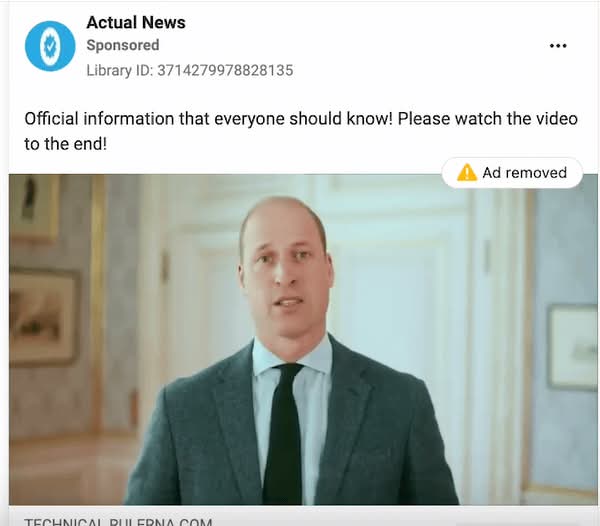Scammers are once again using deepfake technology to dupe unwary internet Facebook and Instagram users into making unwise cryptocurrency investments.
AI-generated videos promoting fraudulent cryptocurrency trading platform Immediate Edge have used deepfake footage of British Prime Minister Sir Keir Starmer and His Royal Highness Prince William to reach an estimated 890,000 people via Meta’s social media platforms.
In one example, deepfake video footage of Sir Keir Starmer assured viewers that “this is not a scam”, while claiming they had been selected to earn a “life-changing” amount of money:
“Your life is about to change. I am Keir Starmer, Prime Minister of the United Kingdom and leader of the Labour Party. I have been waiting for you. Today is your lucky day. I don’t know how you found this page, but you won’t regret it.”
In another version, the fake version of the Prime Minister announced the “National Invest Platform” through which users could start trading and make money around the clock.
Another version of the scam included a deepfake of Prince William, expressing the Royal Family’s endorsement of the scheme:
“Good afternoon, honoured citizens of the United Kingdom. I am pleased to announce that I, Prince William, and the entire Royal Family fully support Prime Minister Keir Starmer’s initiative and his new platform.”

Researchers at Fenimore Harper say that over 250 adverts using deepfakes of Sir Keir Starmer have appeared on Meta’s platforms since the election on July 4 2024, with an ad spend by the scammers of £21,053.
Using Meta’s own AI model, Llama 3.1 70B, the researchers say they were able to identify the fraudulent adverts instantly – raising questions as to why Meta itself has been unable to reduce the number of scam ads about Keir Starmer, which risk outnumbering authentic ones.
The ads claim that Immediate Edge is part of a new platform endorsed by the UK Prime Minister to help users earn life-changing sums of money. If users clicked through to the site they were taken to a landing page which asked them to enter their personal details.
Later, applicants would be hounded by scammers, who encouraged them to make deposits into the fake cryptocurrency trading platform, and to invest even more when shown a fake portfolio purporting to show that great financial gains had been made.
Even after being scammed, some victims continued to believe that Sir Keir Starmer had personally endorsed the platform.

Meta says that its systems detected and removed most of the fraudulent ads before the researchers’ report was published, and reiterated that it had policies in place against ads that misuse the images of public figures for deceptive purposes.
Earlier this year, researchers from the same team discovered more than 100 deepfake video adverts on Facebook posing as footage of the UK’s then Prime Minister Rishi Sunak, pointing to a fake BBC News webpage promoting an investment scam.


